2018 Annual Report | Public Trust and Confidence
NOTE: Please be advised that although the fax number remains in previously published documents, our fax line is no longer in service.
© Her Majesty the Queen in Right of Canada, represented by the Military Police Complaints Commission of Canada, 2019.
Catalogue No. DP1 | ISSN 1700‑6627
Table of Contents
- Letter of Transmission to the Minister
- Chairperson's Message
- Part 1 – Overview
- Military Police Complaints Commission of Canada
- Mandate and Mission
- Organizational Background
- The Canadian Forces Provost Marshal and the Deputy Commander, Canadian Forces Military Police Group/Professional Standards
- The Military Police
- Conduct Complaints Process
- Interference Complaints Process
- Public Interest Investigations and Hearings
- Part 2 – The Year in Review
- Internal Review of Timeliness
- Monitoring and Investigations
- Public Interest Investigation into Anonymous Complaint (Treatment of Detainees)
- Public Interest Investigation into a Historical Complaint Alleging Torture and Abuse of Former Canadian Armed Forces Members during their Training
- Impact on Military Policing – Case Summaries
- Outreach
- Collaboration
- Professional Associations and Community Engagement
- Part 3 – Stewardship Excellence
- Part 4 – Chairperson's Conclusion
- Our Organization
Letter of Transmission to the Minister
March 29, 2019
The Honourable Harjit Sajjan, P.C., M.P.
Minister of National Defence
National Defence Headquarters
Major-General George R. Pearkes Building
Ottawa, Ontario K1A 0K2
Dear Minister:
In accordance with subsection 250.17(1) of the National Defence Act, it is my duty and privilege to submit, for tabling in Parliament, the Military Police Complaints Commission of Canada's 2018 Annual Report.
In this annual report, you will find a detailed discussion of all significant aspects of the Military Police Complaints Commission of Canada's activities during 2018, including summaries of some of its reviews and investigations of complaints.
All of which is respectfully submitted.
Yours truly,
Original signed by
Hilary C. McCormack, LL.B.
Fellow Litigation Counsel of America
Chairperson
Chairperson’s Message

It gives me great pleasure to present the Military Police Complaints Commission of Canada (MPCC) 2018 Annual Report.
This year’s theme centers on building and maintaining Public Trust and Confidence. Last year, I chose thetheme of Oversight and Fairness: Timely, Responsive, Independent. These principles are intrinsically linked and are at the core of providing effective civilian oversight of the Canadian Armed Forces Military Police, a unique police service in Canada. The Auditor General of Canada made a similar link in his examination of Canada’s system of military justice this year when it stated that delays can lead to an erosion of confidence in the system 1. The MPCC had identified the importance of timeliness in recent years, and as discussed in last year’s Annual Report embarked on a process of implementing changes, which continued in 2018, as we seek ways to make our processes more effective and efficient.
Permit me to reiterate something I wrote in my first message as Chairperson of the MPCC, which has taken on heightened meaning in the context of this year’s theme:
The police play a critical role in any democratic society. Fundamental to achieving their mandate and to maintaining the public confidence vested in policing bodies is that any police misconduct or malfeasance be addressed in accordance with the rule of law, and be open to scrutiny. Oversight bodies play the vital role of providing this independent, robust, public and transparent investigation process which is essential to maintaining the public confidence. Public confidence must always be earned and nurtured and never taken for granted.
Those comments from 2015 embody principles of law enforcement developed by Sir Robert Peel for the Metropolitan Police in London, England nearly two centuries ago. Police forces in democratic nations continue to be guided by Peel’s principles outlining what comprises good community policing. Paramount among these principles is the need to secure cooperation from the public, to maintain and secure the respect of the public and to avoid using physical force unless circumstances dictate it is absolutely necessary.
Government overall, and the justice system in particular, are under increasing scrutiny by the public and the media. The importance of oversight in building public trust can best be demonstrated by observing what happens when there is insufficient oversight and that trust disappears. We need only look at recent events across the globe where violence and near-anarchy have befallen communities where the public trust in policing has eroded. No public institution can be complacent going forward. The public must have confidence and trust in the police authorities entrusted with maintaining order.
There is much to suggest that a lack of effective oversight can lead to a breakdown in communications between police and the public whom they are commissioned to protect. Because effective oversight can prevent such an erosion of trust, the MPCC strives to promote and ensure the highest standards of conduct of the Military Police. It is a key element of our mandate to investigate and report on any complaints about the actions and/or behaviour of the Military Police and to protect military police independence through the investigation of interference complaints. The Canadian public, Canada’s Military Police, and members of the Canadian Armed Forces must have confidence and place trust in oversight bodies such as the MPCC.
The existence of an independent body to conduct fair and impartial reviews eliminates any presumption of bias and injects integrity into the process. It also ensures greater confidence in military policing overall.
Our outreach visits at Canadian Armed Forces Bases provide us the opportunity to explain the importance and benefits of civilian oversight. We welcome the questions and opinions of Military Police members and are keen to learn about their challenges. These informal interactions provide us a better understanding of the context in which the Military Police work. In particular, this past year, I had the privilege of visiting the Military Police at Ali Al Salem Air Base, Kuwait, together with the then Canadian Forces Provost Marshal (CFPM), Brigadier-General (BGen) Robert Delaney.
I wish to welcome BGen Simon Trudeau, who assumed the role of CFPM in May and to thank the outgoing CFPM BGen Robert Delaney for his cooperation during his tenure. Our excellent working relationships with the CFPM and the Military Police facilitate the timely disclosure of evidence to support our investigations of complaints. Always maintaining our independence, we appreciate the importance of collaboration with the CFPM and other members of the Military Police leadership.
The MPCC greatly values the positive relationships we have with all stakeholders in the military justice system. We work diligently to ensure mutual respect and understanding by meeting and interacting regularly with Military Police at all levels, as well as military legal officers of the Office of the Judge Advocate General Commodore Geneviève Bernatchez. The MPCC is grateful for their openness to discuss issues of concern.
We have recently completed a major revamping of the MPCC. The organization has been redesigned to strengthen monitoring mechanisms. There is a new executive structure to oversee the complaints process and staff and I am very optimistic about the expected benefits from all the hard work that went into developing the new structure.
The MPCC continues to strive to be a stigma-free work environment where we can openly discuss issues of mental health. As an employer of choice, the MPCC is committed to maintaining an environment where all employees feel welcome and safe. This involved hosting workshops on mental health, acknowledging a diverse range of holidays and events and also ensuring that all employees could participate fully in National Public Service Week by adjusting events to take into account Eid al-Fitr. In particular we took on Positive Space Initiative activities as we strive to be inclusive of everyone, including members of the Lesbian, Gay, Bisexual, Transgender, Queer and Two-Spirit (LGBTQ2) communities. We have identified a Positive Space Ambassador who is available to support and listen to concerns or questions from any employee.
I want to thank Commission Members Michel Séguin and Troy DeSouza for their unwavering support and carrying a heavy workload this past year. We welcome the addition of new Members Bonita Thornton and Ron Kuban, who joined the MPCC in March and May respectively.
It goes without saying that the foundation of our work and our steady progression is due to the dedicated and highly professional MPCC staff. My thanks go out to each of these individuals whose dedication and perseverance are an ongoing source of pride and inspiration.
2018 has been a year of growth and accomplishment. We are ready to take on the challenges expected in 2019.
Original signed by
Hilary C. McCormack, LL.B.
Fellow Litigation Counsel of America
Chairperson
Part 1 – Overview
I - Military Police Complaints Commission of Canada
The Military Police Complaints Commission of Canada (MPCC) was established on December 1, 1999 by the Government of Canada to provide independent civilian oversight of the Canadian Forces Military Police. This was achieved through an amendment to the National Defence Act (NDA) creating a new Part IV, which sets out the mandate of the MPCC and how complaints are to be handled. As stated in Issue Paper No. 8, which accompanied the Bill that created the MPCC, its role is “…to provide for greater public accountability by the military police and the chain of command in relation to military police investigations.”
II - Mandate and Mission
Mandate: The MPCC reviews and investigates complaints concerning Military Police conduct and investigates allegations of interference in Military Police investigations. The MPCC reports its findings and makes recommendations directly to the Military Police and National Defence leadership.
Mission: To promote and ensure the highest standards of conduct of Military Police in the performance of policing duties and to discourage interference in any Military Police investigation.
The MPCC fulfils its mandate and mission by exercising the following responsibilities:
- Monitoring investigations conducted by the Canadian Forces Provost Marshal (CFPM) of Military Police conduct complaints;
- Reviewing the disposition of conduct complaints about Military Police members at the request of the complainant;
- Investigating complaints of interference made by Military Police members; and
- Conducting public interest investigations and hearings.
III - Organizational Background
The MPCC is one of 8 organizations in the Defence Portfolio. While it reports to Parliament through the Minister of National Defence (MND), the MPCC is both administratively and legally independent from the Department of National Defence (DND) and the Canadian Armed Forces (CAF). The MPCC is not subject to direction from the MND in respect of its operational mandate.
The MPCC is an independent federal government institution as defined under Schedule I.1 of the Financial Administration Act (FAA). As an independent oversight agency, the MPCC must operate at a distance and with a degree of autonomy from government, including the DND and the CAF. The MPCC Commission Members and employees are civilians and are independent of the DND and the CAF in fulfilling their responsibilities and accountabilities in accordance with governing legislation, regulations and policies.
Tribunal decisions and MPCC operations and administration must also be, and be seen to be, free from ministerial influence, other than seeking the signature of the MND as the Minister responsible for routine tabling of the MPCC’s Departmental Results Reports, Departmental Reports, Annual Reports to Parliament, and other accountability documents such as Memoranda to Cabinet and Treasury Board submissions.
The Chairperson, as Chief Executive Officer (CEO) of the MPCC, is accountable for all MPCC activities and for the achievement of results. Based on the Terms and Conditions of Employment for Full-Time Governor in Council Appointees, the Chairperson is CEO, statutory deputy head or Deputy Head, as defined by the FAA and as designated through the Governor in Council.
As Deputy Head, the Chairperson is accountable to Parliament for fulfilling management responsibilities, including financial management. This includes accountability for allocating resources to deliver MPCC programs and services in compliance with governing legislation, regulations and policies; exercising authority for human resources as delegated by the Public Service Commission; maintaining effective systems of internal controls; signing accounts in a manner that accurately reflects the financial position of the MPCC and exercising any and all other duties prescribed by legislation, regulations or policies relating to the administration of the MPCC.
IV - The Canadian Forces Provost Marshal and the Deputy Commander, Canadian Forces Military Police Group/Professional Standards
On April 1, 2011, the CFPM assumed full command of all Military Police members who are directly involved in policing. The CFPM also assigns Military Police resources to other supported commanders under operational command.
The Deputy Commander of the Canadian Forces Military Police Group (CF MP Gp) manages public complaints and internal military police misconduct investigations and ensures adherence to the Military Police Professional Code of Conduct.
The CFPM is the first to respond to complaints about Military Police conduct. The MPCC has the authority to monitor the actions taken by the CFPM as it responds to complaints, and to conduct its own reviews and investigations as required. The MPCC has the exclusive authority to deal with interference complaints.
The MPCC’s recommendations, contained in its Interim and Final Reports, are not binding on the CAF and the DND. However, such recommendations do provide the Military Police with the opportunity to improve its operations and further enhance transparency and accountability.
Detailed information about the conduct and interference complaints processes are set out in sub-sections vi) and vii).
V - The Military Police
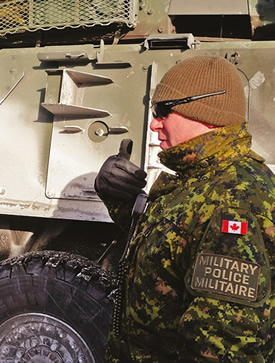
The CAF Military Police Branch was formed in 1968 with the unification of the CAF. Military Police members were allocated to the Army, Navy and Air Force. The stated Mission of the CAF Military Police is to contribute to the effectiveness and readiness of the CAF and the DND through the provision of professional police, security and operational support services worldwide.
The Military Police Branch is comprised of 1,546 personnel: 327 reservists and 1,219 sworn, credentialed members (officers and non-commissioned members). Credentialed members are those members who are entitled to be in possession of a Military Police member badge and identification card and thus are peace officers by virtue of article 22.02 of the Queen's Regulations and Orders, section 156 of the NDA and section 2 of the Criminal Code.
The Military Police exercise jurisdiction within the CAF over both DND employees and civilians on DND property. The Military Police form an integral part of the military justice system in much the same way as civilian police act within the civilian criminal justice system. Military Police routinely train and work with their civilian counterparts in the provision of police and security services to the CAF and the DND.
Members of the Military Police are granted certain powers under the NDA in order to fulfill their policing duties. For example, Military Police members have the power to arrest, detain and search. The Criminal Code recognizes members of the Military Police as peace officers. Therefore, they can make arrests and lay charges in civilian criminal courts. Additionally, Military Police members posted to the Canadian Forces National Investigation Service (CFNIS) can also lay charges under the NDA's Code of Service Discipline..
VI - Conduct Complaints Process
Conduct Complaint Filed
Anyone may make a conduct complaint regarding the Military Police in the performance of their policing duties or functions, including individuals not directly affected by the subject matter of the complaint. Such complaints are initially dealt with by the CFPM. Informal resolution is encouraged.
Complaint Investigated by the CFPM
As the CFPM investigates a complaint, the MPCC monitors the process. At the conclusion of the investigation, the CFPM provides a copy of its final disposition of the complaint to the MPCC. The MPCC may, at any time during the CFPM investigation, assume responsibility for the investigation or call a public hearing if it is deemed to be in the public interest (see section viii).
Request for Review
Complainants may request the MPCC review the complaint if they are not satisfied with the results of the CFPM’s investigation or disposition of the complaint.
MPCC Reviews Complaint
This involves an examination of documentation compiled by the CFPM’s office during its investigation, as well as consideration of applicable legislation, and relevant military and civilian police policies and procedures. Depending on the case, the MPCC’s review may involve interviews with witnesses, including the complainant and the subject of the complaint.
MPCC Releases Interim Report
At the completion of the review, the Chairperson sends the Interim Report to the MND, the Chief of the Defence Staff (CDS) and the CFPM, setting out the MPCC's findings and recommendations regarding the complaint.
Notice of Action
The Notice of Action is the official response by the CAF to the Interim Report. It outlines what action, if any, has been or will be taken in response to the MPCC’s recommendations.
MPCC Releases Final Report
After considering the Notice of Action, the MPCC issues a Final Report of findings and recommendations. The Final Report is provided to the MND, the Deputy Minister (DM), the CDS, the Judge Advocate General (JAG), the CFPM, the complainant(s) and the subject(s) of the complaint, as well as anyone who has satisfied the MPCC that they have a substantial and direct interest in the case.
How the MPCC Carries Out Its Reviews and Investigations of Conduct Complaints
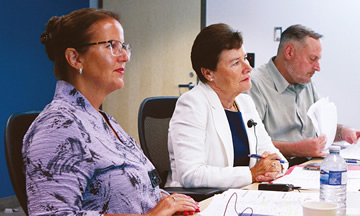
In response to a request from a complainant for a review, the MPCC follows the steps described below:
- The MPCC conducts a preliminary review of the complaint and the related Military Police (MP) files and records, which the Canadian Forces Provost Marshal (CFPM) is obligated to provide, in order to determine how to respond to the request for review; including, whether an investigation is required, the scope of the investigation warranted and how to approach the investigation. The Chairperson may also delegate a Commission Member to handle the file.
- A lead investigator is assigned and, with MPCC legal counsel, reviews the evidence and other materials gathered during the CFPM's investigation of the complaint. This could be hundreds of pages of documents, emails, handwritten notes and reports, and many hours of witness audio and video recordings.
- The lead investigator, in consultation with the assigned legal counsel, prepares an Investigative Assessment (IA) for consideration and approval by the Chairperson or delegated Commission Member. The IA is a report summarizing all the available evidence, and identifying any further lines of inquiry which may be necessary in order to conclude the review of the complaint: further documents or records to be obtained; research on issues of law, MP policy or policing best practices; or witness interviews. Where further investigation is deemed appropriate, the IA will also include timeline and budget estimates which must also be approved.
- If the IA, as approved by the Chairperson or delegated Commission Member, indicates that there is sufficient information to decide the complaint, either with or without further records and/or research, the Chairperson or delegated Commission Member will proceed to prepare the Interim Report, containing the MPCC's findings and recommendations regarding the complaint.
- If the Chairperson or delegated Commission Member determines that witness interviews are required in order to decide the complaint, the assigned investigator(s) will proceed to conduct the interviews. The additional information obtained from these interviews will be summarized and added to the IA to produce an Investigation Assessment Report (IAR). Once the IAR is completed to the satisfaction of the Chairperson or delegated Commission Member, the MPCC will then proceed to the preparation of the Interim Report.
- As described in the previous section, the Interim Report is provided to the MND, the CDS and the CFPM for an official response in the form of a Notice of Action. The Notice of Action will be considered in the MPCC’s Final Report, which will be sent to the parties to the complaint, the relevant departmental officials, as well as anyone who has satisfied the MPCC that they have a substantial and direct interest in the case.
VII - Interference Complaints Process
Interference Complaint Filed
Any member of the Military Police who conducts or supervises investigations and believes a member of the CAF or a senior official of the DND has interfered with or attempted to influence a Military Police member investigation may file a complaint with the MPCC.
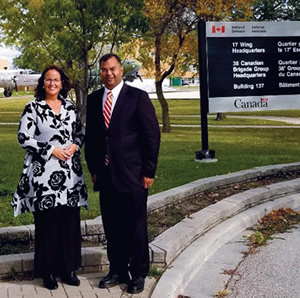
MPCC Investigates
The MPCC has sole jurisdiction to investigate interference complaints. A preliminary review is conducted to determine whether an investigation should be commenced, the scope of the investigation and how to approach the investigation. Once this process is complete, the MPCC begins its investigation.
MPCC Releases Interim Report
The Interim Report includes a summary of the MPCC’s investigation, as well as its findings and recommendations. This report is provided to the MND, the CDS, if the alleged interference was carried out by a member of the military, or to the Deputy Minister (DM) of National Defence, if the subject of the complaint is a senior official of the DND; and to the JAG and the CFPM.
Notice of Action
The Notice of Action is the official response to the Interim Report. It indicates the actions, if any, which have been or will be taken to implement the MPCC’s recommendations.
MPCC Releases Final Report
Taking into account the response set out in the Notice of Action, the MPCC prepares a Final Report of its findings and recommendations in the case. The Final Report is provided to the MND, the DM, the CDS, the JAG, the CFPM, the complainant(s), and the subject(s) of the complaint, as well as anyone who has satisfied the MPCC that they have a substantial and direct interest in the case.
VIII - Public Interest Investigations and Hearings
At any time, if it is in the public interest, the Chairperson may initiate an investigation into a complaint about police conduct or interference in a police investigation. If warranted, the Chairperson may decide to hold a public interest hearing. In exercising this statutory discretion, the Chairperson considers a number of factors including, among others:
- Does the complaint involve allegations of serious misconduct?
- Do the issues have the potential to affect confidence in the Military Police or the complaints process?
- Does the complaint involve or raise questions about the integrity of senior military or DND officials, including senior Military Police members?
- Are the issues involved likely to have a significant impact on Military Police practices and procedures?
- Are the issues of broader public concern or importance?
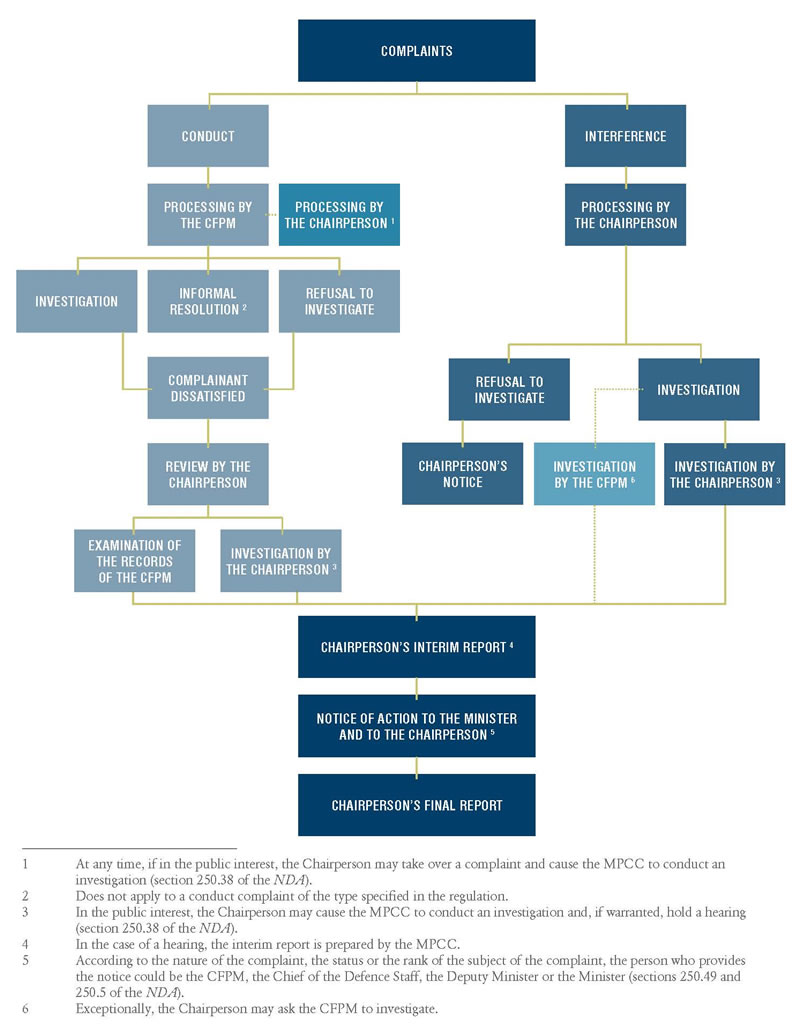
Alternate format
- Complaints
- Conduct
- Processing by the CFPM
- Investigation
- Informal Resolution Figure note 2
- Refusal to Investigate
- Processing by the Chairperson Figure note 1
- Complainant Dissatisfied
- Review by Chairperson
- Examination of the records of the CFPM
- Investigation by the Chairperson Figure note 3
- Review by Chairperson
- Processing by the CFPM
- Interference
- Processing by the Chairperson
- Refusal to investigate
- Chairperson's Notice
- Investigation
- Investigation by the CFPM Figure note 6
- Investigation by the Chairperson Figure note 3
- Refusal to investigate
- Processing by the Chairperson
- Conduct
- Chairperson's Interim Report Figure note 4
- Notice of Action to the Minister and to the Chairperson Figure note 5
- Chairperson's Final Report
Part 2 – The Year in Review
I - Internal Review on Timeliness
As noted in the 2017 Annual Report, the MPCC has been engaged in an ongoing process to improve the timeliness of its investigations while maintaining quality and thoroughness. In 2016, the MPCC undertook a comprehensive internal review of its complaints resolution process leading to an improvement in the overall timeliness of investigations in 2017. Building on the work done in 2016 and 2017, this year the MPCC completed the task of replenishing its investigator pool through a procurement process. Further, the MPCC successfully updated its organizational structure increasing resources for the delivery of its core mandate without increasing its overall budget. In September 2018, the MPCC held an Operations Workshop which brought together all those implicated in the investigative process. This two day event ensured that all key players understood the new procedures and possessed the required knowledge to carry out fair and efficient investigations.
The time frames for each step in our investigative process continue to be tracked in detail, so that adjustments and improvements can be made on an ongoing basis. This will be especially important going forward, as the MPCC has experienced a marked increase in its workload over the last year.
II - Monitoring and Investigations
The following table highlights the MPCC statistics on a four-year comparative basis from 2015 to 2018. The table cannot fully report the increase in the complexity and scope of the types of complaints the MPCC handles, nor accurately predict when complex complaints will be referred. Although the number of new complaints in 2018 decreased slightly, the number of complex cases has increased, requiring more time and resources to complete investigations.
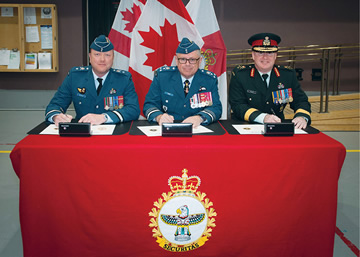
| Statistics from 2015 – 2018 | 2015 | 2016 | 2017 | 2018 |
|---|---|---|---|---|
| Conduct Complaints Carried Over | 31 | 41 | 36 | 53 |
| Interference Complaints Carried Over | 7 | 3 | 0 | 2 |
| Reviews Carried Over | 17 | 23 | 12 | 14 |
| s.250.38 Public Interest Investigations/Hearings Carried Over | 1 | 1 | 1 | 1 |
| Judicial Proceedings Carried Over (e.g. Judicial Review) | 0 | 0 | 0 | 1 |
| Other External Proceedings Carried Over | 1 | 0 | 0 | 0 |
| Total Files Carried Over | 57 | 68 | 49 | 71 |
| General Files Opened (Request for Information and Other) | 69 | 60 | 44 | 64 |
| New Conduct Complaints Note A | 57 | 40 | 63 | 37 |
| New Interference Complaints | 1 | 0 | 2 | 0 |
| New Reviews | 8 | 2 | 12 Note 3 | 9 |
| New s.250.38 Public Interest Investigations/Hearings | 1 | 0 | 0 | 1 |
| New Judicial Proceedings (e.g. Judicial Review) | 1 | 1 | 1 | 0 |
| New Other External Proceedings | 0 | 1 | 2 | 2 |
| Total New Files Opened | 137 | 104 | 124 Note 3 | 111 |
| Total Files under review in the Year | 194 | 172 | 173 Note 3 | 182 |
| Public Interest Decisions/Rulings Issued | 1 | 0 | 1 | 1 |
| Time Extension Decisions Issued | 11 | 9 | 7 | 8 |
| Interim Reports Issued | 6 | 12 | 9 | 6 |
| Final Reports Issued Note B | 13 | 14 | 9 | 8 |
| Reports/Decisions/Rulings Issued | 31 | 35 | 26 | 23 |
| Recommendations on Final Reports | 104 Note 1 | 19 | 11 | 5 |
| Percentage of Recommendations Accepted | 36% Note 2 | 95% | 91% | 80% |
III - Public Interest Investigation into Anonymous Complaint (Treatment of Detainees)
On November 4, 2015, Chairperson Hilary McCormack decided that the MPCC would conduct a Public Interest Investigation (PII) into an anonymous complaint relating to the alleged mistreatment of detainees in Afghanistan by the Military Police. This is the MPCC’s 14th Public Interest Investigation, and the first to be launched based on allegations made in an anonymous complaint.
The complaint alleges that in December 2010 and January 2011, the Commanding Officer of the Military Police Company stationed at Kandahar Airfield, Afghanistan conducted exercises at the Detainee Transfer Facility in order to “terrorize” the detainees.
The complaint also alleges that the CFNIS failed to bring charges against the Military Police Commanding Officer following an investigation. The complainant alleges that no charges resulted from this and subsequent investigations by the Military Police chain of command.
The decision to conduct a PII into this complaint took into account the nature and seriousness of the allegations, the need for an independent, public and transparent investigation process, and the measures taken by the complainant to protect his or her identity. In 2016, the Chairperson co-delegated this file to Commission Member Michel Séguin, and together they are conducting the investigation and will prepare the Interim and Final Reports.
Following delays in the receipt of requested materials from the CFPM (in part attributable to a CFNIS decision to revisit the investigation), the MPCC received more than 3,000 pages of documentation in the summer and fall of 2016.
On February 27, 2017, the MPCC issued a decision regarding the scope of the PII and identified the subjects of the complaint. For reasons elaborated in earlier reports, the MPCC found that it did not have jurisdiction to investigate the aspects of the complaint relating to the conduct of the Military Police members involved in military operations, including the treatment of detainees, and that the administrative nature of an investigation by the Military Police’s chain of command, also fell outside its jurisdiction. Nonetheless, the conduct of the 2011 CFNIS investigation and the CFNIS’ decision not to lay charges following that investigation were found to be within the MPCC’s jurisdiction to investigate. As a result, it was decided that the PII would focus on the conduct of the CFNIS members involved in the 2011 investigation and decision not to lay charges.
The MPCC investigation proceeded with six subjects of the complaint. Throughout 2017, an investigation plan was received and the MPCC requested the assistance of the CFPM in order to access records held by the Canadian Joint Operations Command (CJOC) that could contain relevant documents for the PII. In December 2017, the CFPM wrote to the CJOC Commander to formally request access to the records on behalf of the MPCC. In February 2018, the CJOC Commander provided the MPCC with access to the records.
The MPCC team began to inspect the records held by CJOC in March 2018. When it was learned that additional records were stored in other locations, they were gathered and brought to Ottawa and inspected by the MPCC. The inspection process concluded in September 2018. Copies of the relevant documents identified were provided to the MPCC by CJOC in October 2018.
MPCC investigators began to conduct witness interviews in July 2017. The conduct of the witness interviews continued until September 2018. MPCC investigators travelled throughout the country for over a year to meet and interview over 65 witnesses. MPCC investigators then interviewed the six subjects of the complaint from October to December 2018.
The investigators are currently preparing their Investigation Report, which will be submitted to the Commission Panel. Following this, the Panel will prepare the Interim Report with their findings and recommendations with respect to the complaint.
IV - Public Interest Investigation into a historical complaint alleging torture and abuse of former Canadian Armed Forces members during their training
On April 11, 2018, Chairperson Hilary McCormack decided that the MPCC would conduct a Public Interest Investigation (PII) into a historical complaint that alleges torture and abuse of former CAF members during their training. This is the MPCC’s 15th Public Interest Investigation.
In December 2016, the MPCC received a complaint from Mr. Jeffrey Beamish, a former CAF member. The complaint relates to a CFNIS investigation into alleged torture during training exercises that occurred at the Infantry Battle School at CFB Wainwright between October 1983 and March 1984. The complaint alleges, in essence, that a group of over 30 recruits were subjected to inhumane and emotionally damaging conditions during a Prisoner of War scenario.
The complaint also alleges that this exercise resulted in Mr. Beamish suffering from major depressive disorder, post-traumatic stress disorder, night terrors, paranoia and adjustment issues.
Mr. Beamish made a complaint with the CFNIS about these events. In August 2016, the CFNIS member in charge of conducting the investigation called Mr. Beamish to advise him that the investigation was closed. Mr. Beamish subsequently filed his complaint with the MPCC, alleging that the CFNIS investigator failed to investigate serious criminal matters and that this constituted professional negligence and incompetence.
The MPCC sent the complaint to the CF MP Gp Professional Standards (PS) Section for investigation, in accordance with the process set out in the NDA.
On September 20, 2017, the PS Section concluded its investigation, finding all allegations to be unsubstantiated. On September 26, 2017, Mr. Beamish submitted a request to the MPCC for a review of the complaint.
The MPCC received disclosure of the investigative files and related interview recordings in November 2017. Having reviewed these materials, the MPCC Chairperson decided to exercise her discretion to conduct a PII into this matter, noting that it is in the public interest for the allegations in this complaint to be investigated in an open and transparent manner.
The Chairperson noted that an allegation that the CFNIS failed to investigate serious criminal allegations involving the military chain of command can impact on confidence in the Military Police and its independence, which in turn, heightens the need for an open and transparent investigation to be conducted by an independent agency.
The Chairperson further noted that this complaint raises systemic issues related to the respective roles and responsibilities of the police and prosecutors in making decisions regarding the pursuit of investigations and the laying of charges.
The MPCC identified two additional subjects of this complaint: the Warrant Officer who was in charge of supervising the investigation and the Officer Commanding the CFNIS Detachment at the time of the investigation.
MPCC investigators conducted a detailed review and analysis of the investigative files relating to this complaint in order to assist the MPCC in identifying the witnesses to be interviewed during the PII and in determining whether additional disclosure of documents or information was required. The investigators prepared an Investigative Assessment and Plan which was submitted to the MPCC Chairperson. In September 2018, the Chairperson completed her review of the Assessment and Plan and provided her instructions on the next steps in the investigation.
In October 2018, additional disclosure was requested from the CFPM and the MPCC investigators began to prepare for the interviews with the witnesses. Further additional disclosure was requested from the CFPM and the CAF in November and December 2018. The witness interviews began in November 2018 and continued into 2019.
V - Impact on Military Policing – Case Summaries
The section below summarizes selected conduct cases completed by the MPCC in 2018.
Conduct Complaint Summary MPCC 2015‑016: Alleged Rudeness and Aggression at Traffic Stop
The subject Military Police member was off duty and driving his personal vehicle. He attempted to pull over the complainant (a service member) for seemingly erratic driving on a military base. However, the complainant refused to pull over because the Military Police member was off duty.
About five hours later the complainant was driving off-base, when the subject Military Police member, now on duty and in a patrolcar, accelerated rapidly out of a coffee shop/convenience store lot with his emergency lights activated, pulled in front of other vehicles and pulled over the complainant. The subject Military Police member said something to the effect of, “Remember me”, and proceeded to issue the complainant two offence notices, one for careless driving, related to the alleged eratic driving earlier that day, and another for driving with an expired vehicle registration validation. Other drivers exited their vehicles and walked over to the scene to see why the complainant had been pulled over and to ask why the Military Police member accelerated so quickly away from the coffee shop/convenience store that he caused dirt and stones to be thrown up onto the vehicles behind him. The subject Military Police member apparently told the bystanders in an aggressive and rude manner to go away from the scene of the traffic stop.
The complainant filed his conduct complaint a few days after the events. The Military Police PS Section, under the Deputy Commander CF MP Gp, construed the complainant to be taking issue only with the second incident. They noted that the off-base traffic stop, when the complainant was issued with the offence notices, was for a legitimate purpose and had been authorized by the Military Police member’s supervisor. As such, PS concluded that the on-duty traffic stop was not an abuse of his powers to detain the complainant in retaliation for their earlier on-base encounter, nor was it the result of a personal vendetta. PS did, however, conclude that his demeanor during this traffic stop was unprofessional and aggressive.
The complainant requested a review by the MPCC.
The MPCC reviewed the available evidence, and interviewed witnesses including two witnesses not interviewed by PS.
The MPCC concluded that the subject Military Police member was wrong to have attempted to pull over the complainant’s vehicle during the first interaction. Pursuant to the applicable Military Police Group Orders, the alleged careless driving on the part of the complainant was not sufficiently serious to justify the off-duty intervention, particularly using his personal vehicle. The MPCC also found that the subject Military Police member drove in an overly aggressive manner in his efforts to get the complainant to pull over, and that he was unprofessional in his demeanor while addressing the complainant.
However, given that the complainant was able to disregard the demand to pull over, and the brevity of the encounter, the MPCC did not agree that the complainant had been wrongly detained.
With respect to the second encounter, the MPCC concluded that there was legal authority to stop the complainant off-base in relation to the earlier incident on-base. However, the Military Police member did not demonstrate good judgment in executing the traffic stop as the complainant could simply have been served with a summons; and, in any event, the need to issue the offence notices relative to the earlier incident was not so urgent as to justify rapidly accelerating out of a parking area and cutting off other vehicles. In terms of the Military Police member having abused his authority by directing bystanders away from the scene where he was engaged with issuing the offence notices to the complainant, the MPCC determined that, while the Military Police member did have such authority, the words and tone he used were inappropriate.
As Military Police chain of command had taken some remedial measures in relation to the subject MP, the MPCC did not see the need to make a recommendation to this effect.
The CFPM accepted the MPCC’s findings.
Conduct Complaint Summary MPCC 2016‑039: Alleged Failure to Investigate Harassment Allegations
The complainant attended a Military Police Unit in November 2015 to report that she had been a victim of harassment while she was a reservist. During an interview, the complainant provided a number of examples of alleged harassment and furnished various documents intended to support her allegations.
In response, the Military Police member advised her that her complaint of harassment did not fit within the Military Police mandate to investigate and, accordingly, her file would be closed. She replied that the conduct about which she complained did fall within the Code of Service Discipline, set out in Part III of the NDA.
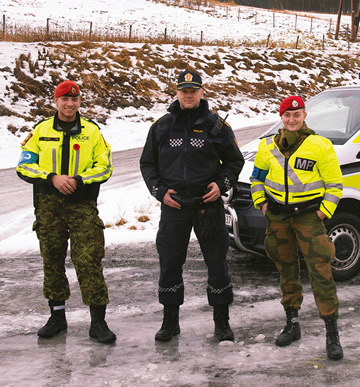
The complainant then sent an email to the MPCC asking why the Military Police were not investigating her allegations of harassment. In her email, she cited the definition of harassment in section 264 of the Criminal Code. The MPCC referred the complaint to the CFPM for an initial review and disposition as a conduct complaint.
The PS office of the CFPM informed the complainant that it had consulted on the definition of criminal harassment in the Criminal Code as well as other definitions of harassment. PS told the complainant that the substance of her complaint did not meet the definition of criminal harassment as that offence is set out in section 264 of the Criminal Code. It further informed the complainant that the actions of Military Police members were proper. PS suggested other possible avenues the complainant could pursue her harassment complaint, such as a CAF Harassment Investigation, the CAF/DND Ombudsman or making a human rights complaint. PS then cited section 250.28(2)(c) of the NDA in saying that no further investigation into the matter was required.
The complainant then referred her complaint to the MPCC for review. The MPCC identified three subjects in the conduct complaint and two allegations: that a Military Police member failed to investigate the complainant’s allegations of criminal harassment and applicable Code of Service Discipline offences; and, that the Military Police member’s chain of command failed to order that an investigation be conducted into the complainant’s allegations.
The MPCC reviewed the Military Police file materials obtained from the CFPM. It also conducted legal research on whether allegations of workplace harassment could result in Code of Service Discipline charges.
The MPCC found that this complaint could not be sustained for two main reasons. One was that the conduct complained of, even if every allegation were taken to be true, did not rise to the level of criminal harassment as set out in the Criminal Code. The other reason was that the allegations so lacked in consistency and particulars that not even a lesser standard of harassment could be met. The reasonableness of the decision not to pursue this matter criminally was bolstered by the fact that numerous possible administrative remedies were readily available. The MPCC made one recommendation: that Military Police members set out clearly their reasons for how they exercise their discretion in deciding whether or not to pursue an investigation into alleged wrongdoing.
The CFPM accepted the MPCC’s findings, and accepted in part the MPCC’s recommendation, stating that while he agreed with the MPCC that direction regarding the documenting of investigative discretion is required, since the original investigation that led to this complaint was concluded, a new CF MP Gp Order has already been put into effect which addresses the concerns raised by the MPCC.
Conduct Complaint Summary MPCC 2017‑055: Alleged Wrongful Recording of Phone Call
This complaint concerned the alleged recording of a telephone conversation the complainant had with a Military Police member. In an email to the PS Section of the CFPM, the complainant stated that she spoke to a Military Police member on the day in question in order to lodge a complaint about the conduct of other Military Police a few days earlier. She alleged that at the end of the conversation the Military Police member informed her that their conversation had been recorded. The complainant objected to this, stating that the recording of a conversation must be acknowledged by the parties to it at the outset. She wished the recording of the conversation to be destroyed and all communications with her to be in writing.
On December 11, 2017, the PS Section of the CFPM wrote to the complainant referring her to section 184 of the Criminal Code which makes it an offence to intercept (record) private communication unless a person has the consent to intercept of the originator of the communication or the intended recipient. PS concluded that the intended recipient of the communication (the Military Police member) was entitled to record it and was not obliged to inform the complainant of his doing so. Given that one party to the conversation had consented to it being recorded, PS concluded that no criminal offence or misconduct had been committed. It therefore informed the complainant that there would be no further investigation of the complaint as per paragraph 250.28(2)(c) of the NDA.
On December 18, 2017, the complainant requested a review by the MPCC.
The MPCC identified one subject of the conduct complaint and one allegation. The subject of the complaint is the Military Police member who spoke with the complainant on the telephone and, at the end of the conversation, is said to have informed the complainant that their discussion was being recorded. The allegation is that the member improperly recorded the complainant’s telephone conversation by not advising her in advance that he was doing so.
Having reviewed the file materials, the MPCC determined that an investigation was required in order to determine why there was no recording provided to the MPCC of the telephone conversation in question. Subsequent inquiries revealed that the subject Military Police member denied that any recording was made of the telephone conversation with the complainant. He further denied that he told the complainant he had recorded their conversation. Also, the MPCC was advised by PS in a letter dated February 14, 2018 that “there is no telephone recording between the complainant and the Military Police member as calls are not recorded when transferred from the dispatch phone to the patrol phones.” Thus, the MPCC was left with two conflicting versions on whether or not the alleged incident occurred. As the information provided by PS that such calls are not recorded corroborated the version of the subject Military Police member, the MPCC, on a balance of probabilities, found the allegation to be unsubstantiated.
The MPCC went on, however, to determine that, even if the Military Police member had recorded the conversation, this would not have constituted misconduct. While section 184 of the Criminal Code imposes a general prohibition on the interception of private communications, paragraph 184(2)(a) of the Criminal Code provides an exception where a person has the consent, express or implied, of either the originator of the private communication or of the recipient, to intercept the conversation. In this instance, the intended recipient of the communication was the Military Police member who would, in the circumstances as alleged, have implicitly consented to its being recorded.
The MPCC further determined that the Canadian Charter of Rights and Freedoms right to be secure against unreasonable search or seizure would not apply in this instance, since any such recording could not be said to have been made for a law enforcement purpose, as the complainant was not suspected by the Military Police of an offence at the time.
In his Notice of Action, the CFPM accepted the MPCC’s finding.
Conduct Complaint Summary MPCC 2017‑004: Alleged Illegal Detention for Urine Sample Due to Faulty Certification of Drug Recognition Expert
The complainant was charged with drug-impaired driving under the Criminal Code following an incident that occurred August 17, 2015 in the Royal Canadian Mounted Police’s (RCMP) jurisdiction. A Military Police member assisted with the RCMP investigation as a Drug Recognition Expert (DRE). The Military Police member arrived at the RCMP Detachment, identified himself as a DRE and proceeded to conduct an evaluation on the complainant. Following the DRE evaluation, the Military Police member demanded the complainant provide a urine sample. The Military Police member then realized that he did not have the proper sample collector and had someone from the Military Police Detachment deliver an approved container, resulting in a short delay.
Two months later, the Military Police member forwarded the laboratory urine analysis to the RCMP investigator, explaining that regardless of the fact that he properly determined the category of drugs in the complainant’s body, the criminal charges for drug-impaired driving could not be pursued as his DRE certification had since been rescinded. This was due to an issue with a DRE course evaluator, which led to the rescinding of all the course participants’ DRE qualifications.
The complainant filed a complaint with the MPCC about the conduct of the Military Police member involved. The CFPM’s PS office investigated the complaint in the first instance and found that at the time of the incident, the subject member was qualified to conduct the DRE evaluation as his certification had not been rescinded. As there was no indication of misconduct on the part of the Military Police member, PS determined that no further investigation was necessary.
The complainant requested the MPCC review PS’ disposition of his complaint. The MPCC conducted an investigation into the following allegations: 1) The subject member improperly failed to confirm that he was in fact DRE certified prior to assisting with the RCMP investigation; 2) The subject member intentionally misled the complainant in causing him to believe he was DRE certified in order to have him participate in the examination and obtain his urine sample; 3) The subject member improperly failed to mention in the DRE evaluation narrative that he did not bring the proper container for a urine sample with him to the RCMP Detachment thus requiring him to drive back to the MPU to obtain the correct container; 4) The subject member should not have obtained the complainant’s urine sample three hours and thirty five minutes after the initial DRE demand was read; and 5) The subject member improperly forwarded his DRE and toxicology reports to the RCMP after knowing he was not DRE certified and without advising the RCMP investigator that his report(s) should not be submitted as evidence or forwarded to any party. In addition, the MPCC looked into allegations that the subject member’s supervisors improperly failed to ensure the validity of his DRE certificate following the completion of the course and on the date of the occurrence involving the complainant.
There were no Military Police member notes, shadow file, or Computer Aided Dispatch (CAD) system entry on this incident at the Military Police Detachment where the subject member was stationed at the time of the incident.
The MPCC found all allegations to be unsubstantiated. The MPCC found that the Military Police member was first advised there was an issue with his DRE qualification well after he conducted the evaluation on the complainant. As it was reasonable for him to assume that his DRE status was valid at the time, the MPCC found that the DRE evaluation was done in good faith. The MPCC considered it was not necessary for the Military Police member to mention in his DRE evaluation that he did not bring with him a sample collector, which caused a delay. The MPCC notes the delay in obtaining the urine sample while waiting for the sample collector was in fact very short, and found there was no issue with the timing of the DRE demands or the actions taken as a result. The MPCC considered the Military Police member followed the DRE protocols in place when he sent the DRE evaluation report and laboratory analysis to the RCMP and that it was appropriate for him to do so, as he was assisting with the RCMP investigation. The MPCC noted the Military Police member was upfront, transparent and diligent when forwarding the laboratory analysis, as he duly pointed out that his DRE certificate had been rescinded and that the evidence he obtained could not be used to support a charge against the complainant. Finally, the MPCC found that there was no reason for the Military Police member’s supervisors to question the validity of the DRE certificate following the completion of the course and on the date of the incident, as the certification issue surfaced well after the Military Police member conducted the DRE evaluation on the complainant. Indeed, even if his supervisors had inquired at the time, the answer they would have received was that the DRE certificate was valid.
The MPCC made four recommendations to address certain deficiencies in the investigation that were identified during the MPCC’s review. In particular, the MPCC recommended that the CFPM ensure that Military Police members record all police activities in their notebooks and enter requests for assistance into the CAD system, that the CFPM ensure that Military Police members verify that their DRE kits are complete at all times and in particular when attending at the roadside or providing assistance to other police services, and that the CFPM direct that Military Police members attach a copy of their DRE certificate to their DRE reports.
In response to the Commission’s Report, the CFPM accepted all of the Commission’s findings. The CFPM also accepted three of the Commission’s four recommendations, noting that Observation Letters would be sent to the appropriate Chains of Command.
The recommendation that a copy of the member’s DRE certificate be attached to any DRE reports submitted was not accepted. The reason provided by the CFPM for not accepting this recommendation was that this is not common practice within Canadian and American law enforcement. The Commission noted that this recommendation was meant to set a best practice in order to limit the risk of creating delays in criminal proceedings and in the complaints process as a result of the need to locate the certificate. It should be noted that the MPCC had difficulty in locating and obtaining the subject member’s DRE certificate which resulted in significant delay. As a result, the MPCC was not satisfied with the CFPM’s response to this recommendation.
VI - Outreach
The MPCC’s outreach program is key to building relationships with the Military Police, the community they serve, the CAF at large as well as other key stakeholders. The value of meeting people face-to-face cannot be overstated. The MPCC greatly appreciates the efforts of the many individuals who organized, supported and participated in its outreach activities at the bases and the Canadian Forces Military Police Academy (CFMPA) as well as at other events.
Ali Al Salem Air Base, Kuwait
Together with the then CFPM, BGen Delaney, MPCC Chairperson had the privilege of visiting the Ali Al Salem Air Base in Kuwait in February 2018. The Chairperson made presentations to the MPs and the Command structure regarding civilian oversight of policing and the MPCC mandate. The Chairperson was particularly pleased to gain a more fulsome appreciation of the MPs’ experiences and challenges while deployed and considered this visit to be of mutual benefit.

Canadian Armed Forces Locations across Canada
These annual visits to military locations across Canada increase awareness of the MPCC’s mandate and activities, build relationships with stakeholders and provide an opprotunity to respond to questions and concerns about the complaints process. The primary audiences are:
- members of the Military Police who may be subjects, complainants or witnesses in conduct or interference complaints;
- the military chain of command, which relies on the services of members of the Military Police to maintain military discipline, but cannot interfere with police investigations; and
- those who may interact with the Military Police because they live, work, or visit a CAF base. The MPCC’s connection to this group is often made through the executive directors and staff of the Military Family Resource Centre (MFRC) at each base.
The MPCC’s goal is to reach as many members of the military family as is possible, while respecting the operational realities of CAF bases and wings across the country and abroad.
In 2018, MPCC staff visited 4th Canadian Division Training Centre Meaford, Ontario; CFB Shilo, Manitoba; 17 Wing Winnipeg, Manitoba; 5th Canadian Division Support Base (5 CDSB) Gagetown, New Brunswick; and 4 Wing Cold Lake, Alberta.
The feedback provided by participants who attended the 2018 information sessions at bases and at the CFMPA remained positive and is used to continuously improve the content and style of presentations.
Military Police Academy
In addition to visits to CAF bases throughout Canada, the MPCC continued to have a significant presence at the CFMPA located in Borden, Ontario. Staff and members provided numerous presentations as part of courses for Military Police members at the CFMPA. Throughout the year, the MPCC and Academy staff have continued to collaborate to ensure MPCC presentations are tailored to specific courses. The MPCC looks forward to continuing this interaction with the Military Police Academy.
Canadian Institute's 9th Annual Law of Policing Conference
The MPCC Chairperson attended the 9th Annual Law of Policing Conference which took place May 1‑2, 2018 in Toronto, Ontario. The MPCC Chairperson spoke as part of a panel entitled “Conducting Systemic Reviews and Police Oversight”. She provided a comparative overview of models of civilian review and oversight of policing across Canada and the panel discussed some of the challenges facing police oversight bodies today.
VII - Collaboration
Throughout the year, the MPCC continued to work towards resolution of a number of complex and challenging matters with the National Defence leadership, the CFPM, the military chain of command and the Military Police community. This work is undertaken with a view to making the complaints process more efficient and effective.
Canadian Forces Provost Marshal
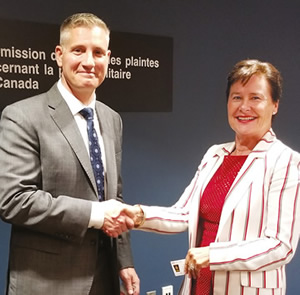
The MPCC Chairperson and the CFPM continued the practice of having semi-annual meetings to discuss issues of mutual interest, including their core mandates and objectives. On May 7, 2018, the MPCC Chairperson and Senior General Counsel and Director General met with the outgoing CFPM, BGen Delaney, and the incoming CFPM, BGen Trudeau, to discuss the transition. The Chairperson was honored to attend the CFPM/Commander CF Military Police Group change of command ceremony later that month. On November 22, 2018, the MPCC Chairperson, met with the CFPM along with their respective key staff to discuss issues with respect to the complaints process and to find ways to improve the process.
Further, Colonel Martin Laflamme, Deputy Commander MP Group, accompanied by Major Russell, Lieutenant Eagleson, and Captain Day, provided a presentation to the MPCC on September 18, 2018 during the MPCC’s Operations Workshop. The interactive session provided MPCC personnel with a better understanding of the Military Police’s roles, organizational structure and responsibilities as well as PS operations. The presentations also provided an informative update regarding the Sexual Assault Review Program (SARP) which includes the reopening in September 2018 of certain sexual assault investigations previously dismissed by military police as “unfounded”.
These meetings have been fruitful in ensuring strong lines of communication and a collaborative relationship.
Canadian Forces Judge Advocate General
This year, on April 26, 2018, the MPCC Chairperson and Senior General Counsel and Director General also met with the CAF’s top military lawyer, the Canadian Forces JAG, Commodore Geneviève Bernatchez. The Chairperson and Commodore Bernatchez had an excellent discussion of issues of mutual concern, regarding the efficient and fair processing of complaints. Indeed, this discussion led to a follow-up meeting on October 10, 2018, between the MPCC Senior General Counsel and Director General and the Deputy JAG to continue the discussion.
MPCC-CFPM Working Group
Established in 2015, the MPCC‑CFPM Working Group is an MPCC initiative to establish an ongoing forum to discuss and clarify issues regarding disclosure of Military Police information to the MPCC – specifically regarding what categories of information may properly be exempt from disclosure to the MPCC and how those categories are defined. The group is comprised of senior legal advisors from both organizations. The Working Group met in 2018 and work has commenced to establish a Standing Operating Procedure aimed at addressing some of the concerns regarding redactions to disclosure and making the process more efficient and consistent.
VIII - Professional Associations and Community Engagement
Canadian Association for Civilian Oversight of Law Enforcement
The Canadian Association for Civilian Oversight of Law Enforcement (CACOLE) is a national, non-profit organization of individuals and agencies dedicated to advancing the concept, principles and application of civilian oversight of law enforcement organizations across Canada and abroad. CACOLE is recognized worldwide for its oversight leadership. The MPCC’s Chairperson is a member of CACOLE.
CACOLE’s annual meeting was held this year in Winnipeg, Manitoba from May 27‑30 and was attended by the Chairperson and MPCC staff. This year’s theme was “Civilian Oversight: The Road Forward”. Panel discussions focused on a wide range of topics, including Bias-Free Policing, Professionalization of Oversight, the Role of Governance, and Ethics.
International Commission of Jurists Canada
The International Commission of Jurists Canada (ICJ Canada) is an independent, non-governmental, non-partisan organization, and a registered Canadian charity. Its membership is composed exclusively of members of the legal profession: judges, lawyers, law professors, and law students from across Canada. The ICJ’s mission promotes the cause of international human rights, the independence of the judiciary and the rule of law worldwide. MPCC’s Senior General Counsel and Director General is a member of the ICJ Canada’s Board of Directors in the role of Secretary-Treasurer. In addition, the Chairperson and several MPCC lawyers are members of the organization.
Canadian Bar Association
The Canadian Bar Association (CBA) is a professional, voluntary organization which represents some 36,000 lawyers, judges, notaries, law teachers, and law students from across Canada. Approximately two-thirds of all practicing lawyers in Canada belong to the CBA. Through the work of its sections, committees and task forces at both the national and branch levels, the CBA is seen as an important and objective voice on issues of significance to both the legal profession and the public. The MPCC’s lawyers are members of various sections of the CBA such as Military, Administrative Law and Criminal Law Sections.
Council of Canadian Administrative Tribunals
The Council of Canadian Administrative Tribunals (CCAT) is a national organization that supports the work of administrative tribunals and encourages excellence in administrative justice. The MPCC’s General Counsel and Senior Director of Operations is a member of the Board of Directors and was a speaker at the CCAT Symposium which took place in June 2018. In addition, the MPCC articling student participated in a simulated hearing on December 13, 2018 as part of a training course for new adjudicators.
Association of Professional Executives of the Public Service of Canada
The Association of Professional Executives of the Public Service of Canada (APEX) provides executives with opportunities to develop a strong community of practice, promote their physical and mental well-being, and support excellence in leadership. All members of the MPCC executive team are members of the association. The MPCC’s Senior Director of Corporate Services has participated in workshops and discussions on topics of significance to the public service as a whole such as Bill C‑81, Accessible Canada Act, an Act to ensure a barrier-free Canada.
Crime Prevention Ottawa
Crime Prevention Ottawa is an organization which works closely with local residents, government, police, school boards, businesses, community services, child protection and other partners to reduce crime and build safer communities. The MPCC’s Senior General Counsel and Director General serves as a member of the Board of Directors of this organization.
Part 3 – Stewardship Excellence
I - Financial Management
In 2018 the MPCC continued to demonstrate sound management of its financial resources. It effectively planned, managed and controlled its budget and expenditures to meet operational and central agency requirements including timely and accurate financial reporting. Throughout 2018 regular financial updates were provided internally to the MPCC Executive Committee and externally to central agencies in order to reinforce rigorous financial management and control.
Operating Budget: The MPCC’s ongoing annual budget of $4.3M supports the delivery of the MPCC’s legislative mandate under Part IV of the NDA. This includes complaints resolution and all other activities to support central agencies’ requirements, and reporting to central agencies and Parliament (Departmental Plans, Departmental Results Reports, Annual Reports, Financial Statements and Quarterly Financial Reports).
Additional Financial Information: Additional financial information about the MPCC’s financial and expenditure management may be found in the Publications Section of the MPCC’s website in the Departmental Plan, the Departmental Results Report, Quarterly Financial Reports, Annual Financial Statements and Proactive Disclosures.
II - Information Management and Information Technology
The MPCC launched a Twitter account, creating a social media presence for the organization. In addition, the organization’s web site was optimized to meet new Treasury Board’s guidelines.
The MPCC is continuing to make progress in implementing information management best practices, and the shift to digital information management is on track. Some of the tasks we have accomplished include the partial digitization of files from Finance and Human Resources and the complete digitization of those from Legal Services. It is anticipated that the project will be completed in the coming year. The migration of information to Documentum, our information management system, is also progressing well. This approach will improve information management, especially with regard to searching for information.
III - Mental Health and Wellness
The MPCC has continued to educate its employees about mental health and well-being by sharing information and encouraging participation in events related to this topic. Each month this year, the Senior General Counsel and Director General shared testimonies from public service employees about mental health, and information bulletins about the Employee Assistance Program. The MPCC also promoted Mental Health Week in May, the Get Loud Campaign and the World Mental Health Day in October.
The MPCC has also continued to participate in the LifeSpeak campaign, which provides mobile access at all times to a confidential, bilingual electronic learning platform for employees and their families. Two mandatory information sessions were also provided to all employees, with one session focusing on the Public Service Occupational Health and Safety Program and the other on the opioid crisis in Canada.
IV - Diversity
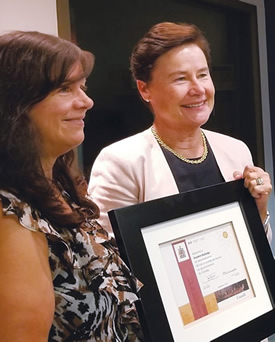
As part of its commitment to developing a diverse work environment, this year the MPCC continued to create an accessible work environment by addressing barriers and proactively addressing accommodation requirements to allow the full participation of its employees in the work environment.
The MPCC also provided its employees with information about Ramadan and modified its activities for National Public Service Week to accommodate Eid al-Fitr. The MPCC also promoted Asian Heritage Month, Islamic History Month, invited its employees to take part in the Positive Space Survey, and issued a reminder about International Day against Homophobia, Transphobia and Biphobia.
Finally, in October the MPCC offered an information session to all employees on Positive Space in order to ensure that the MPCC is a welcoming and inclusive environment for all, including members of the Lesbian, Gay, Bisexual, Transgender, Queer and Two-Spirit (LGBTQ2) communities. The organization also appointed a Positive Space ambassador who is available to support and listen to any employees who have questions about issues relating to this community.
IV - Public Service Employee Annual Survey
Following the results of the 2017 Public Service Employee Survey, an independent committee of volunteer employees has been established. The purpose of the committee is to review the results of the survey, to identify the areas of importance on behalf of MPCC staff and offer recommendations to the management on how to address any concerns and make improvements to the workplace.
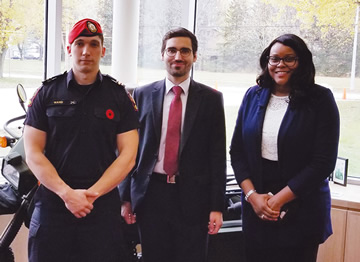
Part 4 – Chairperson's Conclusion
Our annual report theme this year is maintaining Public Trust and Confidence, both in ourselves, as an oversight body, and in the Military Police.
This theme is not unique to this year or this report. It is an imperative that has guided, and must continue to guide, our efforts as an oversight body. In Canada, we can be proud of our commitment to open, respectful and accountable governance that values citizen engagement. The MPCC has, for almost 20 years, been a small part of that structure.
In fulfilling its mission to provide independent civilian oversight of the CAF Military Police, the MPCC is committed to constant, ongoing improvements of its operations. Earlier in this report, I described our recent restructuring. This process of introspection will continue as we seek to reduce delays and reach more timely decisions. This effort supports the desired outcomes for the overall system of military justice identified in the spring 2018 report of the Auditor General
of Canada.
Effective oversight contributes in a powerful way to building public trust. The MPCC aims to create trust in the Military Police and among all members of the CAF and Canadians – the Military Police being itself an organization important to upholding public trust and the rule of law within the military as a whole.
December 1, 2019 will mark the MPCC’s 20th anniversary. This milestone will provide us with an opportunity to look back on what we have accomplished, how we have matured as an organization, what further improvements could be made, what challenges the future may hold and ways we can meet those challenges. In order to help focus our thoughts, and to generate new ideas, we are planning to organize a symposium in December 2019 to mark the coming into effect of our governing legislation on December 1, 1999.
At the MPCC, we are open to, and proactive in, finding creative practical solutions to challenges we face in discharging our oversight mandate. Legislative gaps that hindered or delayed our work have been noted in earlier annual reports. In response to these legislative impediments, we are seeking novel and pragmatic approaches to better ensure the fairness, efficiency and credibility of the oversight we provide. One such area is the development of a standard operating procedure regarding the disclosure of information from the office of the CFPM. Specifically, we are seeking to ensure that any redactions are kept to a minimum and that necessary redactions are done efficiently and consistently. Excessive or inconsistent redaction of information which is required to be disclosed to the oversight body impedes the timeliness of our work, imposes hardship on the parties, both complainants and subjects, and can diminish public confidence in our work, which can then lead to diminished confidence in military policing.
Solicitor-client privileged information is one area where the CFPM, quite correctly, redacts material provided to the MPCC. There are, however, cases where such information would better enable the MPCC to resolve complaints more fairly and transparently. It is worth remembering that this information is, of course, available to the CFPM. Moreover, the other federal police oversight body (the Civilian Review and Complaints Commission for the RCMP) has legislative authority to access such information.
In this area, the MPCC is pursuing an administrative arrangement between ourselves and the CAF, whereby we could request access to this information in certain cases, provided that the necessary safeguards can be put in place.
Regardless of the success of these initiatives, this should not be understood as diminishing in any way the MPCC’s calls for legislative improvements made in previous annual reports.
We have just completed a busy and productive year. We are confident that 2019, culminating in our 20th anniversary, will be equally or more productive.
Hilary C. McCormack, LL.B.
Fellow Litigation Counsel of America
Chairperson
Our Organization
Biography of the Chairperson
Hilary C. McCormack, LL.B.
Chairperson
Hilary McCormack was appointed Chairperson of the Military Police Complaints Commission of Canada, effective October 5, 2015.
Prior to her appointment, Ms. McCormack was Director of Crown Operations (East Region) at the Ontario Ministry of the Attorney General, a position she had held since 2009. As Regional Crown Attorney, she supervised 10 Crown Attorney offices and was responsible for criminal prosecutions and summary conviction appeals in Eastern Ontario. In addition to her management duties, Ms. McCormack continued to prosecute many high profile and complex trials. She received the Ministry of the Attorney General Excelsior Deputy’s Award in 2010.
Ms. McCormack graduated from the University of Western Ontario’s law school. Following her call to the Ontario Bar in 1980, she was in private practice for three years before joining the Ontario Ministry of the Attorney General as Assistant Crown Attorney in 1983. She was seconded to the federal Department of Justice in 1992. Her work as General Counsel, Criminal Law and Policy, resulted in amendments to the Criminal Code which enhanced the general protection of women and children from sexual and physical violence for which she received the Department of Justice Deputy Minister’s Merit Award in 1994.
She returned to the Ontario Ministry of the Attorney General in 1994 where she continued to prosecute complex homicides and to develop her expertise in a number of criminal justice issues: child abuse, sexual assault and domestic violence; best practices in case management and trial processes and mental health. Over the course of her career, she travelled to Thailand and Kosovo to provide legislative and policy advice in these areas and frequently hosted many foreign delegations, including delegations from Russia, China, Afghanistan and the Palestinian Authority, on systemic issues and best practices.
Ms. McCormack prosecuted the first case in Canada to successfully use DNA evidence. She subsequently established an ad hoc committee to provide advice about the use of DNA evidence to Crown prosecution services and police services across Canada and internationally. She also worked on policy and legislative initiatives for both the DNA warrant provisions and the DNA data base which have transformed policing and prosecutions in Canada. This interest in facilitating transformative change also prompted her to implement a Drug Treatment Court, an Adult Mental Health Court and, for the first time in Canada, a Youth Mental Health Court while she was the Crown Attorney for Ottawa, an appointment she received in 2000, and the first woman to ever hold that position.
Between 2000 and 2005, Hilary McCormack was a member of the Department of National Defence’s Military Police Advisory Committee which provided advice to senior military leadership about significant changes to the military police and their investigative capacity. The committee’s recommendations improved the military police’s relationship with civilian courts and prosecution services, and provided opportunities for enhanced police training and education. In April 2016, she was formally inducted into the Litigation Counsel of America (LCA) at the LCA’s 2016 Spring Conference & Celebration of Fellows. She is a member of the International Commission of Jurists Canada.
Hilary McCormack has taught criminal law at the University of Ottawa, at the Bar Admission course, and served on the faculty of the Federation of Law Societies Criminal Law program. She is a frequent speaker at judicial, legal and police conferences, helped develop instructional material for the National Judicial Institute, and written and published extensively on various legal issues. She has served as a volunteer on the boards of directors and committees of not-for-profit organizations.
Biographies of the Commission Members
Michel Séguin (March 2014 – present)
Commission Member
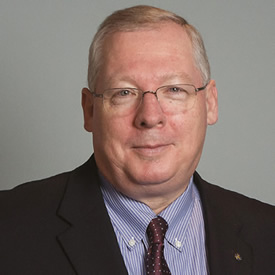
Michel Séguin was appointed as a Commission Member March 6, 2014. He served as Interim Chairperson of the MPCC from March 28, 2015 to October 4, 2015.
Mr. Séguin has extensive operational policing experience, having spent 33 years with the Royal Canadian Mounted Police (RCMP). During his service with the RCMP, he held the position of Ethics and Integrity Advisor and adjudicated Code of Conduct hearings. Mr. Séguin retired from the RCMP in 2008 as Assistant Commissioner and the Commanding Officer of “O” Division (Ontario).
After his retirement from the RCMP, Mr. Séguin joined the House of Commons Administration as Director General, Parliamentary Accommodations Services, a post he held for five years.
Mr. Séguin was invested as an Officer of the Order of Merit of the Police Forces in May 2008 and a Serving Member of the Order of the Hospital of St John of Jerusalem in 2002. He is also the recipient of the Commemorative Medal for the 125th Anniversary of the Confederation of Canada, the Golden Jubilee Medal and the Royal Canadian Mounted Police Long Service Medal with Silver Clasp.
Troy DeSouza (October 2015 – present)
Commission Member

Troy DeSouza was appointed as a Commission Member in June 2015.
A long-time resident of Victoria, British Columbia, he has practiced law in B.‑C. for the past 20 years, providing legal advice to local government clients. He has conducted litigation before administrative tribunals, appeal boards, and at all levels of courts in British Columbia.
Mr. DeSouza is also an educator. He has created several courses for local government staff and elected officials. He is a member of numerous professional organizations, and was past Chair of the Municipal Law Section of the Canadian Bar Association, B.‑C. Branch.
Troy DeSouza is a graduate of the University of Windsor’s law school. He had a diverse career before being called to the Bar in 1998. He worked as a consultant for the Attorney General of Ontario, and served seven years in the Canadian Armed Forces where he obtained the rank of Captain.
Bonita Thornton (March 2018 – present)
Commission Member

Ms. Bonita Thornton was appointed as a Commission Member in March 2018. Ms. Thornton is a lawyer, manager and military veteran with extensive government and regulatory experience in administrative and criminal law. Previously she led Investigations Departments at the Law Society of Ontario and the College of Physiotherapists of Ontario.
Ms. Thornton worked for twelve years as a lawyer and officer with the Office of the Judge Advocate General, Canadian Armed Forces. From 2006 until 2012 she held the position of Assistant Judge Advocate General, Central Region, where she oversaw five legal offices across Ontario and provided advice and training to military commanders, police and personnel on a broad spectrum of legal and operational issues. She was deployed to Afghanistan in 2008‑2009 as the senior legal advisor to the Canadian Task Force in Kandahar. Ms. Thornton grew up in Northern Ontario, graduated from Laurentian University and has worked across the country. She graduated from Queen’s Law School in 1997 and was called to the Ontario Bar in 1999. Ms. Thornton has received the Queen Elizabeth II Golden Jubilee Medal, Queen Elizabeth II Diamond Jubilee Medal and 125th Anniversary of the Confederation of Canada Medal for her contributions to Canada and her community.
Ron Kuban, Ph.D. (May 2018 – present)
Commission Member

Dr. Ron Kuban was appointed as a Commission Member in May 2018. A graduate of the Royal Military College in Kingston, Ontario, he completed his M.Ed. and Ph.D. at the University of Alberta. For the last 48 years, he has been employed in the public sector of Canada and Alberta, and in his consulting company regarding emergency/crisis management.
Dr. Kuban has held numerous senior positions of responsibility, both paid and voluntary. The former includes service as a Commissioned Officer in the CAF, a Commissioner on the Edmonton Police Commission, a Member of the Parole Board of Canada and currently as a Member of the Alberta Social Services Appeals Board.
Dr. Kuban volunteered for over 30 years on numerous Boards at local, provincial and national level, and was recognized for his service. Aside from his military medals, he was awarded the Queen’s Golden and Diamond Jubilee medals, as well as the Alberta Centennial Medal.
Organizational Structure of the Commission
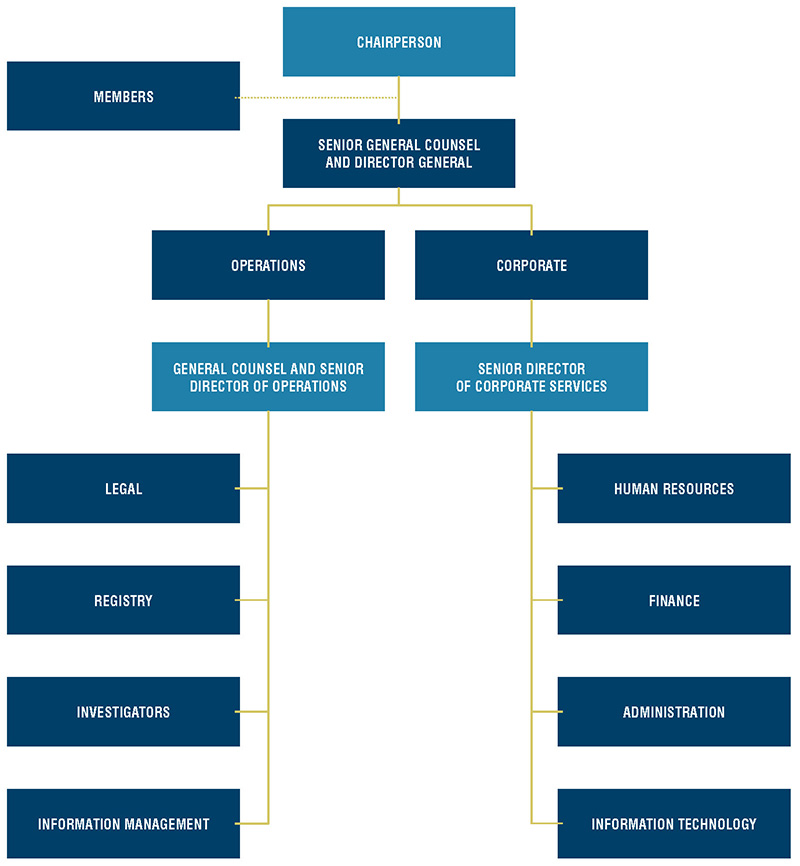
Alternate format
The image illustrates the Military Policy Complaints Commission of Canada's (MPCC) organizational structure, last updated in September 2016.
The chart is described from top to bottom starting with the highest position, being that of the Chairperson.
The Chairperson is linked to the Members, the General Counsel and Senior Director General of Operations and the Senior Director of Corporate Services.
The General Counsel and Senior Director General of Operations manages
- Legal
- Registry
- Investigators
- Information Management
The Senior Director of Corporate Services manages
- Human Resources
- Finance
- Administration
- Information Technology

How to Reach the Military Police Complaints Commission of Canada
Call our information line
613‑947‑5625 or toll-free at 1‑800‑632‑0566
Send us a fax
613‑947‑5713 or toll-free at 1‑877‑947‑5713
Send us a letter
Military Police Complaints Commission of Canada
270 Albert Street, 10th floor,
Ottawa, ON K1P 5G8
Visit us at the above address for a private consultation. An appointment is recommended.
Send us an email
We cannot guarantee the security of electronic communications.
Visit our website
- Date modified: